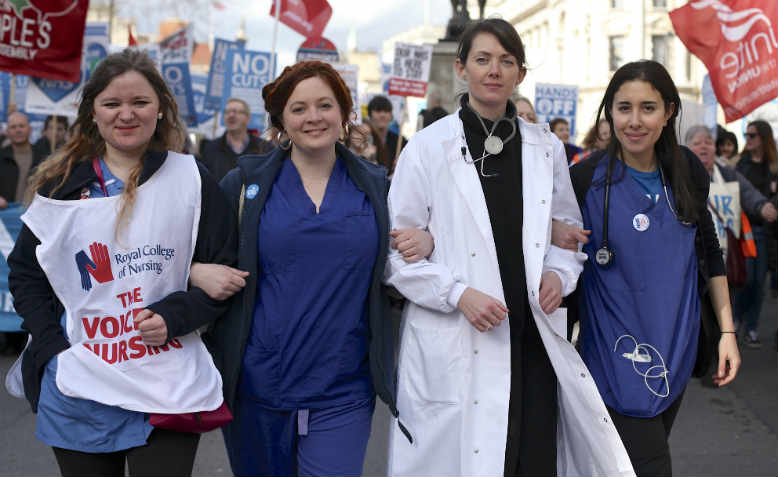 Danielle Tiplady, Jacqui Berry, Aislinn Macklin-Doherty and Mona Ahmed at Our NHS march, 4th March. Photo: David Bailey
Danielle Tiplady, Jacqui Berry, Aislinn Macklin-Doherty and Mona Ahmed at Our NHS march, 4th March. Photo: David Bailey
“The NHS is the fairest and most efficient health care system that can exist.” Peter Stäuber talks to Aislinn Macklin-Doherty, an activist and Junior Doctor.
The fight for the NHS has been going on for many years. Are we presently at the most critical juncture?
I think that this is the endgame of a 30-year systematic approach to transfer a public, universal health care system into an insurance-based health care system. And because the British public don‘t want it, it‘s been done slowly and insidiously. And this year‘s introduction of charges for overseas patients is the final straw, really. As soon as you introduce charges for one group of patients, you then have the potential to bring it in for everyone.
Last year junior doctors went on strike against Jeremy Hunt‘s proposed new contract. The strike was finally called off in September and Hunt proceeded with the imposition of the contract. Why was the strike called off?
The calling off of the industrial action arose as a result of overwhelming pressure from government and the media, and because the NHS was already in a serious crisis. So doctors felt that they would be putting lives at risk if they took further action.
Was that a popular decision among junior doctors?
A lot of doctors were very angry that the contract was imposed anyway. They were backed into a corner. They are still very angry, and I would not be surprised if we saw a further emergence of resistance against what‘s happening to the NHS.
Did you reach out to other trade unions and activists during the strike?
I was among a group of people who pushed for alliances, particularly with our NHS colleagues, but also wider public sector workers, because their struggle is exactly the same. And I was very pleased that the BMA supported the NUT with their strike action in July. I think that was a very monumental bridge of support between two similarly struggling public sector services. And I think we should build on that and push for further alliance building.
Why do you think the support from the public was so solid?
I think they know that the NHS is the fairest and most efficient health care system that can exist, and it‘s being removed against their will. The NHS is unique in allowing doctors to put clinical decision above cost, so patients trust that we are making decisions in their best interest. I think that‘s why they supported us and supported the NHS: because they could see that we‘re trying to defend it.
What has happened since the end of the strike last year?
With the winter crisis and reports of people dying in their trollies, the precarious state of the NHS has become clearer to the public. So, the things that we were shouting about last year – and have been shouting about for many years actually – are hitting home now, and the devastating consequences can be seen in much starker terms.
What needs to happen now to roll back the privatisation of the NHS?
We need to avoid isolating individual workers or groups of workers, and instead start building networks across the NHS, but also the wider public sector services. The demonstration on the 4th of March is the beginning of that level of networking – it‘s been called by umbrella healthcare groups, trade unions and the People‘s Assembly. That‘s the start of what is needed, but we have to have this sort of activity on a more recurrent and a more organised level. We just need to build on that kind of networking.
Will strike action be called again by the junior doctors?
It‘s not impossible. Obviously, considering that the NHS is a sinking ship, it would be difficult because it poses a moral dilemma for doctors: when it‘s so short staffed and underresorced, the decision to walk out is much more difficult, but it‘s probably our duty. It might be the only choice to prevent things getting worse.
Is the level of protest that we’ve seen since the beginning of the Trump presidency going to help that?
Yes, definitely. We‘re seeing people now getting involved who have not been on protests before in their lives. People who would casually ask me about strike action at dinner party conversations last year are now going to the anti-Trump demos, and they‘ll be coming on the 4th of March demo as well.

